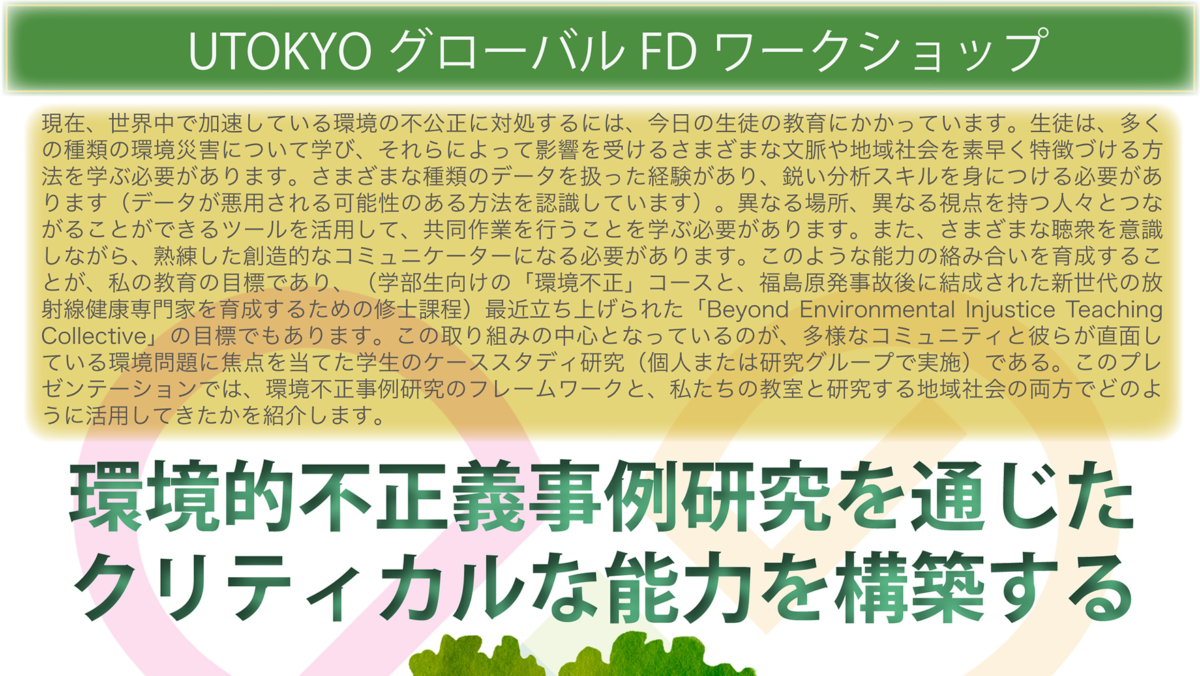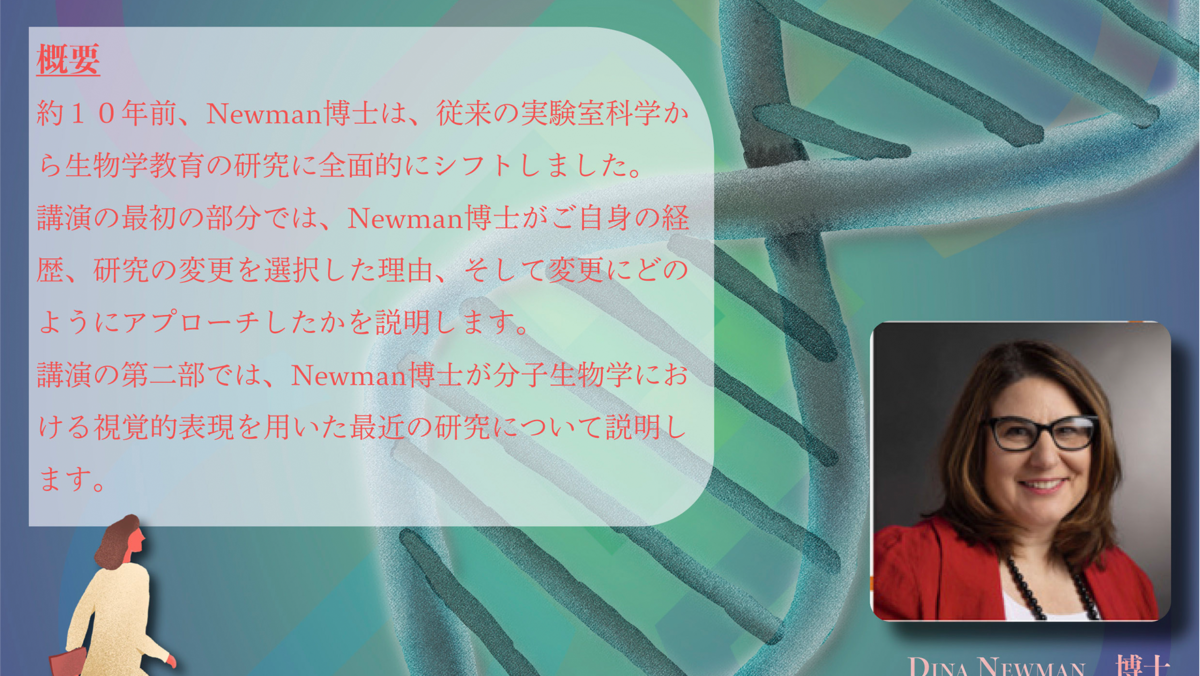Chapter 1 “Time flies! I’ve Been Struggling to Write the Article Only to Realize that the First Half of the Program Already Finished!”
Long time no see! I’m Nabetan, Research Support Staff (FFP).
FFP is a series of sessions consisting of eight DAYs. DAY 5 will be held on this Thursday and Friday. The program’s first half finished last week, and we are about to enter the latter half, but this journal has not been updated since DAY 0 (i.e., before the commencement). I apologize for that from the bottom of my heart!
I thought of explaining what the sessions were like one by one in a hurry, but since we’ve come so far, I’d like to take a somewhat so-what attitude… Let me explain what I realized by taking the sessions of DAY 1–DAY 4 with other participants (while doing my own job). (Although almost all of the followings are already referred to by Dr. Kurita in the sessions…)
By the way, the sessions of DAY 1–DAY 4 were a period for the FFP participants to acquire the necessary mindset, knowledge, and skills. (How they develop them is also very interesting!) DAY 5 is for the reflection of their learning so far, and the participants will start preparing for the microteaching sessions and refining their lectures to be conducted on DAY 6 and DAY 7.
Let’s get back to the main point. What I realized through DAY 1–DAY 4 is the following three points:
(1) Every class has a common specific “structure.”
(2) The level of support given by the instructor to the learners/participants gradually diminishes.
(3) Activities are set up in every part of the class so that the learners/participants can experience what they learn.
I found difficulty in writing the article for DAY 1 after taking the session on DAY 2 because I was concerned about whether it was right to write an article per DAY when we have to wait for the coming sessions to find out the special designs of activities based on (3). (It may seem like just an excuse, but this is really what I was struggling with.)
Now, let me show you what (1) “structure” is.
The framework of a class is composed of “Introduction, Development, and Conclusion.” This structure almost always applies to class design in elementary and secondary education. The structure itself is not a unique thing, but let me elaborate on it a little more.
<“Goals” and “Objectives” shown in the Introduction>
The “goals” and “objectives” of a class are always shown in the Introduction section of each class.
They are expressed in the word “Aims” at the beginning of a class (or a unit) in elementary and secondary education, so it is a very ordinary thing to “tell the students the aims of this class.”
However, you will realize through various lectures and activities on DAY 2 “Class Design” and DAY 3 “Evaluation” how careful you should be to set and put into words the “objectives.” “Objectives” are “specified goals,” so let’s get back to what “goals” are.
In terms of “objectives,” I was convinced by the following words of Dr. Kurita: “A goal is what the course exists for and is an answer to the students’ question of ‘Why do I have to learn this?’”
I’m sure teachers at elementary, junior high, and senior high schools are often asked this question by their students. The goal itself is not just for answering this question, but if you can explain what you consider a goal in an understandable way, you can answer their questions confidently. (Although whether you can convince them or not is another problem…)
By the way, the doers of learning are learners, so the subject of the sentences used to describe goals is “learners.”
Now, “objectives” are specific “goals,” and Dr. Kurita referred to them as “Things that you would like students to be able to do, which become exactly what you evaluate.”
In terms of the first half, objectives should not be something that expresses the instructor’s philosophy or passion, but they should be something that grasps the situation of the learners and be set at “a realistic yet challenging level.” Dr. Kurita referred to this as “the distance students can reach by jumping,” and this expression sits well with me since I used to play volleyball before.
The second half clearly shows that the objectives can become the “criteria for evaluation” by “writing sentences with learners as the subject” same as the goals and “describing them in observable behavior (i.e., describing them with verbs)”.
“Integration of objectives and evaluation” is a phrase that often appears in workshops in elementary and secondary education. If you look at it from the opposite side, the existence of the slogan means that “objectives and evaluation are not integrated” in the real world. I think many teachers (including myself) have struggled in this regard.
Then, why aren’t they integrated? I think that’s because the “objectives” are not likely to be “written in observable behavior and expressions that can become the criteria for evaluation.”
Checking the “objectives” of real classes that appear in various case studies and materials used in training programs from this perspective, I found out that only a few of them are described properly. And I myself must reflect on my own classes in the past.
Now, let me show you what the “goals” and “objectives” of the UTokyo FFP were like, which were shown in the Introduction sessions of DAY 1–DAY 4. Here is the citation from the lecture slides (handouts).
==========
DAY1 Introduction
[Goals] To become familiarized with online courses and understand their potential, to set a clear goal of learning at UTokyo FFP by grasping the significance and goals of the course, and to get to know other participants enrolled in the course.
[Objectives] *To experience and get accustomed to the procedure of conducting/taking an online course. *To remember five or more names of participants. *To be able to explain the present situation of higher education. *To discover and be able to explain the values of learning at UTokyo FFP to others.
DAY 2 Class Design
[Goals] To understand the features and structure of a class that promote student learning and to be able to design a class by yourself.
[Objectives] *To be able to explain what you should do to increase students’ motivation. *To be able to explain the significance of class design. *To be able to explain what the ADDIE model is. *To be able to select the appropriate active learning strategy in accordance with the objective. *To be able to design a class in which students learn effectively.
DAY 3 Evaluation
[Goals] To obtain basic knowledge in evaluating student learning, to understand the significance and features of evaluation, and to be able to apply evaluation to student learning.
[Objectives] *To be able to explain the significance of evaluation. *To be able to contrast formative evaluation and summative evaluation. *To be able to explain any given evaluation method based on the features of evaluation. *To be able to create a rubric. *To be able to express one’s thoughts on the merits and demerits of rubrics.
DAY 4 Syllabus and Course Design
[Goals] To understand the roles of a syllabus and course design that enhance student learning and to learn about the design method.
[Objectives] *To be able to list three or more roles of a syllabus. *To be able to set appropriate course goals and objectives. *To be able to create a graphic syllabus. *To be able to improve the syllabus you have brought with clear reasons.
==========
How was it? It is certain that “evaluation” exists behind the “objectives,” but that’s all for today.
I would like to write about another remarkable structure (1) “conclusion” and then move on to (2) and (3) in the next article.
For more details on DAY 1–DAY 4, please check the following website for the 15th UTokyo FFP lecture slides.
https://ocw.u-tokyo.ac.jp/course_11441/
I hear that the filmed lectures will be uploaded in due course (following the copyrights and portrait rights procedures). (DAY 1 is already available!)
“Nabetan Journal” does not cover the entire contents of FFP, so I would like to provide references. I hope they would be helpful to you.
See you next time!
Osami Nabeta
Research Support Staff (FFP)
Center for Research and Development of Higher Education
(Coordinator, Nonprofit Organization SOMA)












